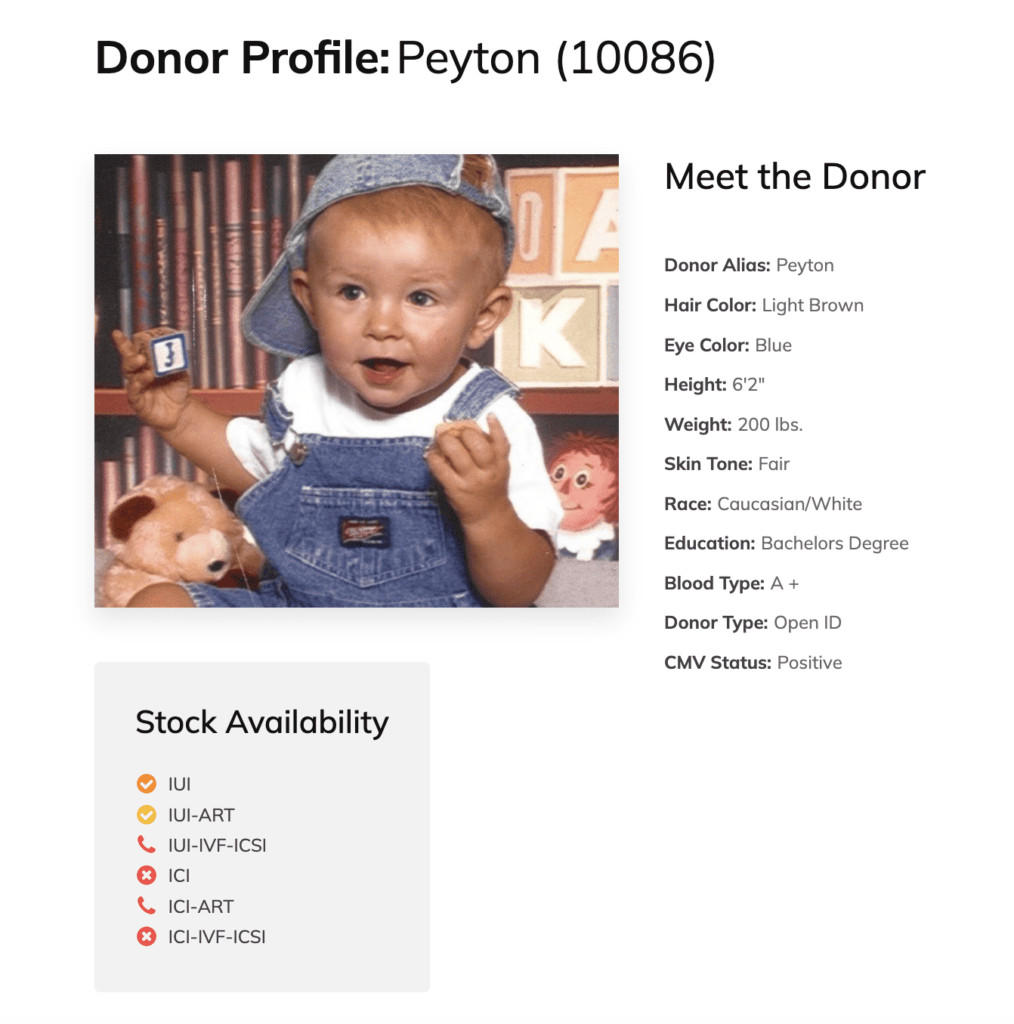What is CMV?
CMV, cytomegalovirus, is a member of the herpesvirus family and is highly prevalent worldwide. You can become infected with CMV through bodily fluids, including saliva, urine, blood, seminal fluid, and breast milk. The most common transmission modes are through close contact with infected individuals or exposure to bodily fluids. It is important to note that CMV can be present in an individual's body without causing any symptoms or illness, making detecting and preventing transmission challenging.
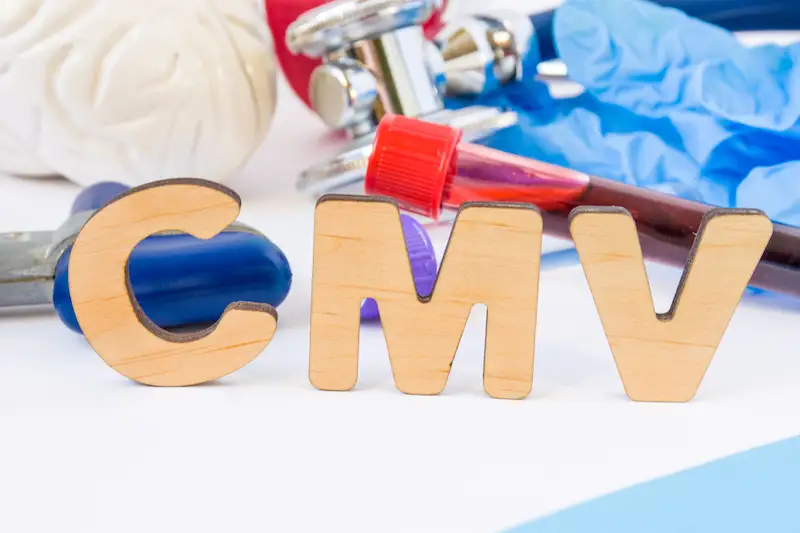
How Common is CMV?
The CDC states that nearly 1 in 3 children have already been infected with CMV by age 5, and by the age of 40, over half of the population is infected. The prevalence of CMV in sperm donors varies depending on the screened population. Studies have shown that CMV infection rates among sperm donors range from 30% to 70%. However, it is essential to note that the presence of CMV does not necessarily indicate active infection or the potential for transmission. Donor screening protocols typically include testing for CMV antibodies, which can help determine if the donor has contacted the virus in the past.
Symptoms of CMV Infection
CMV infection can manifest differently in individuals depending on their immune system and overall health. Many people infected with CMV may not experience symptoms or only have mild symptoms that resolve independently. However, those with weakened immune systems, such as individuals with HIV/AIDS or undergoing organ transplantation, may develop severe complications. These can include pneumonia, hepatitis, retinitis (inflammation of the retina), and neurological disorders. Awareness of these symptoms and seeking medical attention if necessary is crucial.
Becoming Infected With CMV
Primary CMV infection occurs in people who have never been exposed to the CMV virus before. Once a person becomes infected with CMV, the virus remains alive but dormant inside their body for the rest of their life. Recurrent CMV infection is when a dormant virus becomes active again. CMV infection is usually harmless and rarely causes illness. However, primary CMV infection can cause more severe problems for pregnant women than recurrent CMV infection.
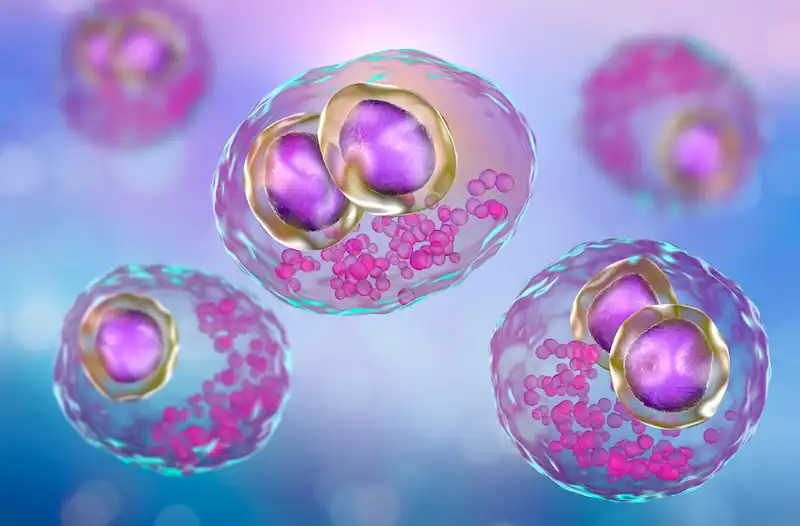
Cytomegalovirus
CMV in human cells.
Diagnosis and Treatment of CMV Infection
Diagnosing CMV infection involves various methods, including blood tests to detect the presence of CMV antibodies or viral DNA. Other tests like urine or saliva samples may also confirm active infection. Treatment options for CMV infection depend on the severity of symptoms and the individual's immune status. A healthcare provider may prescribe antiviral medications to manage the condition and reduce the risk of complications.
Prevention of CMV Transmission in Sperm Donation
Preventing CMV transmission in sperm donation involves following proper protocols and procedures. Donor screening for CMV antibodies is essential in identifying potential donors who may pose a higher risk of transmission. Additionally, implementing strict guidelines for handling and processing donated sperm can help minimize the risk of contamination. Cryopreservation techniques, such as freezing and quarantine periods, can also be employed to ensure that donated sperm is free from infectious agents before use.
CMV Protocols At Cryobank America
The FDA requires CMV testing on all men who intend to donate sperm. A positive result, however, doesn't necessarily mean that a man will be ineligible to donate. Cryobank America will obtain semen samples from potential donors and then quarantine those specimens for at least six months. During that time, the donor may have had CMV antibody levels tested several times. If the antibody tests indicate the possibility of a CMV infection close to the time of the sperm donation, the donor will not be allowed to donate their specimens. If the testing demonstrates inconclusive results, the donor will not be permitted to donate. However, if a donor tests positive for CMV IgG only, indicating a past infection, he will be eligible to contribute. These samples appear in the Cryobank America donor database as CMV-positive.
Can Washed Donor Sperm Transmit CMV?
No, clinically washed sperm is typically free from CMV (Cytomegalovirus) transmission. The sperm-washing process separates sperm from the seminal fluid, which reduces the risk of transmitting infections such as CMV. However, no medical procedure can guarantee 100% elimination of all viruses or infections. You should always consult a healthcare professional for personalized advice and information.
Considering Pregnancy Through Donor Sperm?
Women considering pregnancy with donor sperm should have CMV antibody testing as part of their IDT. Those with a past infection are at low risk of transmitting CMV infection to a fetus and are at little to no risk if they decide to use a CMV-positive donor.
Women never exposed to CMV should consider using a CMV-negative donor. Even though the risk from a CMV-positive donor is low, it is impossible to determine whether there will be a risk for infection.
Cryobank America's donor catalog has a CMV search filter for positive and negative sperm donors. To find a CMV-negative sperm donor, select negative under the CMV option!
CMV Resources
For additional information on CMV, this link is especially helpful:
https://www.mayoclinic.org/diseases-conditions/cmv/symptoms-causes/syc-20355358
If you have any questions about CMV, please email us at [email protected] or call 817-945-8708; we will be happy to help!
Why Millions of Women Are Becoming Single Mothers By Choice
Statistics show that the number of Single Mothers By Choice (SMBC) has steadily increased. According to a study published in the Journal of Women's Health in 2019, the number of single women using assisted reproductive technologies (ART) to conceive has steadily risen. The study found that between 2004 and 2015, there was a 29% increase in the number of single women using ART. Statistics have also shown that the average age of SMBC who conceive through artificial insemination is between 35 and 45. While statistics for recent years may not be available, this trend will likely continue. Various factors contribute to this rise, including changing societal norms, increased acceptance of non-traditional family structures, and advancements in reproductive technology.
There are several reasons why a woman may choose to become a single mom by choice through donor sperm. Some women strongly desire to become mothers and may not want to wait for a partner or have not found the right one. They may feel ready to start a family and believe they can provide their child with a loving and nurturing environment.
Women approaching their late 30s or early 40s may feel the pressure of their biological clock ticking. They may pursue single motherhood to ensure they can have a child before it becomes more complex or risky due to age-related fertility decline.
Some women value independence and may prefer raising a child independently rather than compromising their lifestyle or goals by waiting for a partner. They may feel confident in independently providing for and raising a child.
Some women may have difficulty finding suitable partners with whom they want to start a family. They may not want to settle for someone who does not meet their criteria or values and, therefore, choose to become single mothers by choice.
Women who are financially stable and have the means to support themselves and their children may feel confident in their ability to provide for their child's needs without relying on a partner's income.
For some women, becoming a mother is an important personal goal or dream they want to fulfill, regardless of whether they have a partner. They believe motherhood will bring them joy, purpose, and fulfillment.
Single women with solid support systems in the form of family, friends, or communities may feel more confident in their decision to become a single mother by choice. They know they will have emotional, practical, and financial support when needed.
It is important to note that each woman's reasons for choosing single motherhood may be unique and personal to her. It is a deeply personal decision that every woman should make after careful consideration and reflection on one's circumstances, values, and desires.
The Role of Donor Sperm in Empowering Women to Start Families
Donor sperm plays a significant role in empowering women to start families on their own terms. By breaking down societal stigmas and stereotypes, donor sperm allows women to challenge traditional notions of family and motherhood. It provides options for women who may not have a partner or a conventional family structure, allowing them to create the family they desire.
Donor sperm promotes autonomy and choice in family planning. It gives women the freedom to decide when and how they want to become mothers without relying on a partner or waiting for the "right" time. This empowerment can positively impact women's overall well-being and sense of fulfillment.
By choosing to become single mothers through donor sperm, women also challenge societal expectations and norms. They show that motherhood is not limited to traditional family structures and that women can be successful parents regardless of their relationship status. This shift in perception can lead to greater acceptance and support for single mothers using donor sperm.
Time is of the Essence: Why Women Shouldn't Wait Too Long to Become SMBC
There are several reasons why women shouldn't wait too long to become a single mother by choice through donor sperm. The most crucial factor is how age affects fertility. As women age, their fertility declines, and the chances of conceiving decrease significantly. The quality and quantity of eggs decrease, making it more challenging to get pregnant. Waiting too long may result in the need for assisted reproductive technologies like in vitro fertilization (IVF) or even the use of donor eggs. Pregnancy at an older age carries higher health risks for both the mother and the baby. Older women are more likely to develop gestational diabetes, high blood pressure, and other complications during pregnancy. Additionally, there is an increased risk of genetic abnormalities in babies born to older mothers.
Raising a child as a single parent is a significant responsibility that requires emotional stability and readiness. Waiting too long may lead to missed opportunities for personal growth, emotional maturity, and financial stability before embarking on parenthood.
Family Planning and SMBC Support
Starting a family earlier allows more time for family planning and potentially having multiple children if desired. Waiting too long may limit the number of children a woman can have or increase the need for fertility treatments.
Building a support network is crucial when raising a child alone. Waiting too long may result in losing out on potential support from parents, siblings, or close friends who may be older or less available due to their circumstances.
More Energy and Stamina
Parenting requires physical stamina and energy, especially during the early years when children demand constant attention and care. Waiting too long may result in reduced energy levels, making it more challenging to keep up with the demands of parenting.
It's important to note that these reasons are general considerations and may not apply to every situation. Each person's circumstances are unique, and it's essential to consult with medical professionals, fertility specialists, and mental health experts to make informed decisions about family planning.
Steps SMBC Can Take to Get Started
Find A Reputable Fertility Clinic
The first step in becoming a single mother by choice through donor sperm is to find a reputable fertility clinic that specializes in assisted reproductive technologies. Here are some key considerations and steps involved in this process:
- Research and gather information: Research different fertility clinics in your area or internationally. Look for clinics with experience and expertise in donor insemination or intrauterine insemination (IUI) procedures. Read reviews, check success rates, and consider the clinic's reputation.
- Consultation: Schedule an initial consultation with the fertility clinic of your choice. During this appointment, you can discuss your desire to become a single mother by choice and explore different options. The fertility specialist will evaluate your medical history, perform necessary tests, and assess your overall health to determine if you are a suitable candidate for the procedure.
- Legal considerations: Familiarize yourself with the legal aspects surrounding donor sperm usage and single motherhood in your country or state. Understand the legal rights and responsibilities of the donor and yourself as the intended parent.
- Donor selection: Once you have chosen a fertility clinic, you must select a sperm donor. Cryobank America maintains a catalog of high-quality, pre-screened donors with detailed profiles, including physical characteristics, medical history, fertility history, education, interests, handwritten letters, audio interviews, and additional childhood photos. You can choose a donor based on specific criteria that are important to you.
- Insemination procedure: Depending on your specific circumstances and medical advice from your fertility specialist, you may be able to perform insemination in the privacy of your home. If fertility intervention is required, you may undergo intrauterine insemination (IUI) or in vitro fertilization (IVF) using your chosen donor sperm. IUI involves placing prepared sperm directly into your uterus during ovulation. In contrast, IVF involves fertilizing your eggs with donor sperm in a laboratory before transferring the resulting embryos into your uterus.
- Follow-up and monitoring: After the insemination procedure, you will have regular follow-up appointments with your fertility clinic to monitor your progress, track ovulation, and potentially perform pregnancy tests.
It is important to note that the process may vary slightly depending on the clinic and country regulations. It is recommended to consult with a fertility specialist who can guide you through the specific steps and requirements of your situation.
Planning For Future Siblings as A Single Mother By Choice

How Many Children Do You Envision?
Preparing for future siblings as a single mother by choice through donor sperm can be an exciting and vital step. Reflect on how many children you envision having and what age gaps you would like between them. Once you've decided, it will help you plan for future pregnancies and determine the timing of using donor sperm again.
Assessing Finances as A SMBC
Assess your financial situation and consider the costs associated with raising multiple children. Plan your budget accordingly, considering expenses such as childcare, education, healthcare, and other necessities.
Emotional Preparedness For Multiple Children
Reflect on your emotional readiness to expand your family. Consider how having another child may impact your life, time, and energy. Ensure you are emotionally prepared to provide multiple children with love, care, and attention. If your existing child is old enough to understand, have open conversations about the possibility of having siblings in the future. Address any concerns or questions they may have and involve them in the decision-making process if appropriate.
If you plan to use the same donor again, speak with Cryobank America regarding the availability of your donor, and consider ordering additional vials to store within our laboratory until you're ready to expand your family. If you plan to use a different donor for your second insemination, find a suitable match for future siblings. Consider factors such as genetic compatibility, health history, and personal preferences.
Single Mothers By Choice Support Groups
Connect with other single mothers by choice through support groups or online communities. They can provide valuable insights and advice on preparing for future siblings and managing multiple children as a single parent. Build a strong support network of friends, family members, or fellow single parents who can offer assistance when needed. A reliable support system can help alleviate some challenges of raising multiple children.
Prioritize self-care and ensure a sound support system to help you manage the demands of raising multiple children. Take time for yourself, practice self-care, and seek assistance when needed.
Remember that every family is unique, and there is no one-size-fits-all approach to preparing for future siblings. Trust your instincts, seek guidance when necessary, and embrace the joy of expanding your family.

Deciding When and How to Tell Your Child They Are Donor Conceived
Choosing when and how to tell your child they are donor-conceived is a personal and complex decision. Experts generally recommend starting the conversation early, ideally before age 5, as children at this age are more open to accepting new information. However, the exact timing will depend on your child's maturity level and ability to understand complex concepts.
It is important to be honest with your child about their conception story. Children will have many questions regarding their origins, and keeping this information from them can lead to feelings of betrayal or confusion later in life. Tailor your explanation based on your child's developmental stage. Younger children may need to know that they were conceived with the help of a special person who donated sperm or eggs. Older children may ask for more detailed information about the process.
Ensure your child understands that being donor-conceived does not change the love and bond you share as a family. Reassure them that they are wanted and cherished. Be prepared for questions and emotions that may arise after sharing this information. Create an open environment where your child feels comfortable discussing their feelings and concerns.
If you feel unsure or overwhelmed about approaching this conversation, consider seeking guidance from a therapist or counselor experienced in fertility issues or family dynamics. You can also learn about the experiences of other families with similar circumstances. Read books, articles, and online resources discussing disclosure's impact on donor-conceived children.
Remember, every family is unique, and there is no one-size-fits-all approach. Trust your instincts as a parent and do what feels right for your child and your family.
- Protecting Your Health: Choosing A Sperm Bank Over Natural Insemination
- Hatching a Plan: Learning The Basics About Assisted Hatching in IVF
- Navigating GYN Surgery Before Artificial Insemination
- PGT Testing and Its Role in IVF Treatment
- The Ultimate Guide To Where You Can Donate Sperm In All 50 States
How Many Vials Should I Purchase For At-Home Insemination?
On average, it takes five attempts for most women to become pregnant with at-home insemination. It would be best if you had enough vials of sperm in storage to cover multiple insemination attempts, as it is common for a donor's inventory to sell out temporarily. While many clients achieve pregnancy on their first attempt, it usually takes several insemination cycles. That's why many people purchase 2-3 vials per order, while others purchase more in anticipation of using the same sperm donor for future siblings. However, we recommend ordering 2 Premium IUI, or Premium ICI vials for at-home insemination.
Timing Is Everything
Timing is the most critical factor in achieving fertilization. Therefore, ordering two vials allows you to perform two inseminations during your highest peak days. We always recommend our Premium IUI vials since they contain 25M/ml per 1 ml vial and have undergone our gradient density separation "washing" process. Since they are sold in 0.5ml quantities, you must order two vials to receive 25 million motile sperm cells. However, many of our clients have conceived following their first insemination with one Premium IUI or ICI vial.
What If My Chosen Donor Only Has ART Vials Available?
If you order our IUI ART or ICI ART for at-home insemination, you will also be encouraged to purchase two vials.
Purchasing Vials In Advance
If you want to purchase vials before you're ready to perform the insemination, we can store your vials within our cryobank until you're ready to begin. You can also ask us for your chosen donor's current availability before you decide to purchase a large quantity of vials.
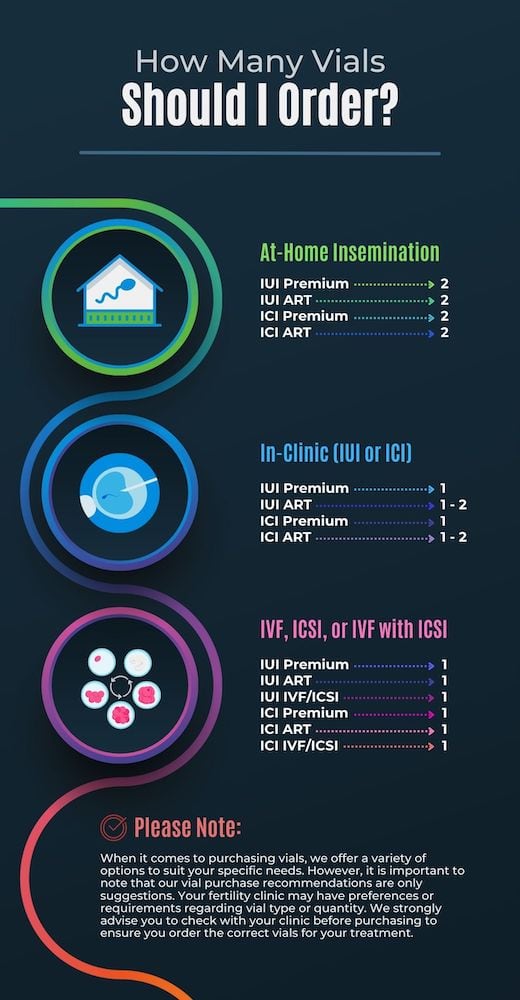
How Many Vials Should I Purchase For My In-Clinic Procedure?
Speak With Your Fertility Specialist
Before you place your vial order, you should speak with your fertility specialist to find out how many vials you will need based on your unique situation. They will establish this quantity based on your needs, such as your overall fertility health, age, lifestyle, and other factors that could impact fertilization.
IUI vs. ICI
You have the option to order our IUI vials or our ICI vials. Since IUI vials are pre-washed, we recommend them for in-clinic use. ICI vials are unwashed, so your clinic will wash your specimen at their laboratory for an additional cost. Some clinics may even prefer unwashed ICI vials so they can perform their washing technique.
Your clinic may only recommend purchasing one Premium IUI or Premium ICI vial if you acquire optimal fertility health. For our IUI ART and ICI ART vials, your clinic will most likely recommend purchasing at least two vials.
Clinic Vial Delivery
Once you place your vial order, we will ship your vials right to your fertility clinic. Your fertility specialist will then maintain your vials' proper storage, handling, and thawing.
How Many Vials Should I Order For An IVF, ICSI, or IVF with ICSI Procedure?
Since IVF (in vitro fertilization) and ICSI (intracytoplasmic sperm injection) rely on laboratory fertilization, vials containing a lower sperm count can accommodate these procedures. Your fertility clinic will explain how many vials you will need and what vial type they recommend, but in most cases, you will only need to purchase one IVF/ICSI vial. You can order any vial type for your IVF, ICSI, or IVF/ICSI procedure; however, we offer IUI IVF/ICSI vials and ICI IVF/ICSI vials at a lower cost than our premium and ART vials. Some fertility clinics may prefer ICI IVF/ICSI vials so they can wash the specimen in their laboratory as opposed to using a sample that has been pre-washed.
Still Have Questions?
If you have any questions concerning your vial order, don't hesitate to pick up the phone and call us!
For more information on our vial types, click here.
- Protecting Your Health: Choosing A Sperm Bank Over Natural Insemination
- Hatching a Plan: Learning The Basics About Assisted Hatching in IVF
- Navigating GYN Surgery Before Artificial Insemination
- PGT Testing and Its Role in IVF Treatment
- The Ultimate Guide To Where You Can Donate Sperm In All 50 States
Our Mission
Cryobank America is committed to providing high-quality reproductive services to individuals and couples looking to start or expand their families. Our mission is to offer a diverse range of sperm donors, ensuring everyone can access the best options for their unique needs.
Why Diversity in Our Donor Collection is Important to Us
Background and Cultural Heritage
We understand the importance of diversity and inclusivity in our donor pool. Regardless of race or ethnicity, every individual should have the opportunity to find a donor who reflects their background and cultural heritage. That's why we are constantly working towards recruiting more ethnically diverse sperm donors.

Representing All Races and Ethnicities
Diversifying the sperm donor pool is crucial for several reasons. Firstly, it ensures that all races and ethnicities have representation and access to donor sperm. By having a diverse collection of donors, individuals or couples seeking a donor can find a match that aligns with their racial or ethnic background, preserving cultural and familial ties.
Genetic Compatibility
Furthermore, diversity in sperm donation is essential for matching donors with recipients. Genetic compatibility plays a significant role in the success of assisted reproduction techniques. By having a diverse donor collection, healthcare providers can better match recipients to donors with similar genetic traits, increasing the chances of a successful pregnancy.
Equal Access
Lastly, diversity in sperm donation promotes social justice and equity. It challenges the notion that certain races or ethnicities are more desirable than others and promotes the idea that everyone deserves equal access to reproductive technologies. By diversifying the sperm donor pool, we can create a more inclusive and equitable society.
How You Can Help Us Expand Our Donor Database
By expanding our donor database to include a broader range of ethnicities, we aim to provide a more comprehensive selection for our clients. We recognize that representation matters, so we do everything possible to create an inclusive environment where everyone feels valued and respected.
If you want to become a sperm donor with Cryobank America, we encourage individuals from all backgrounds to apply. Your contribution can make a significant difference in someone's life and help fulfill their dreams of starting a family. We welcome diversity and value the unique qualities that each individual brings.
Celebrate the Beauty of Diversity
Join us in creating a more diverse and inclusive community by becoming part of Cryobank America. Together, we can help individuals and couples achieve their dreams of parenthood while celebrating the beauty of diversity.
- Protecting Your Health: Choosing A Sperm Bank Over Natural Insemination
- Hatching a Plan: Learning The Basics About Assisted Hatching in IVF
- Navigating GYN Surgery Before Artificial Insemination
- PGT Testing and Its Role in IVF Treatment
- The Ultimate Guide To Where You Can Donate Sperm In All 50 States
How To Prepare For At-Home Insemination Before Placing Your Vial Order
At-home insemination is a method of assisted reproduction that allows couples to conceive without medical intervention. It involves using donor sperm to inseminate the female partner at home. You can use any of our vial options for at-home insemination. However, our premium IUI and ICI vials are recommended over all other options, which you can learn more about by clicking here.
One of the main benefits of at-home insemination is the privacy and convenience it offers. Couples can avoid the stress and expense of fertility clinics and have more control over the process. Whether you are purchasing donor sperm for at-home insemination or to have a procedure performed at your fertility clinic, our Clinic Release Form must be signed and submitted to us before you can complete your online purchase.
First Steps in Preparing for At-Home Insemination
Health & Wellness Check
Before placing your vial order with Cryobank America, ensuring both partners are in good health and have undergone necessary medical check-ups and testing is essential. This assurance includes checking for any underlying medical conditions affecting fertility and testing for sexually transmitted infections. It is also advisable to consult with a healthcare professional to ensure that at-home insemination is a safe and appropriate option for you.
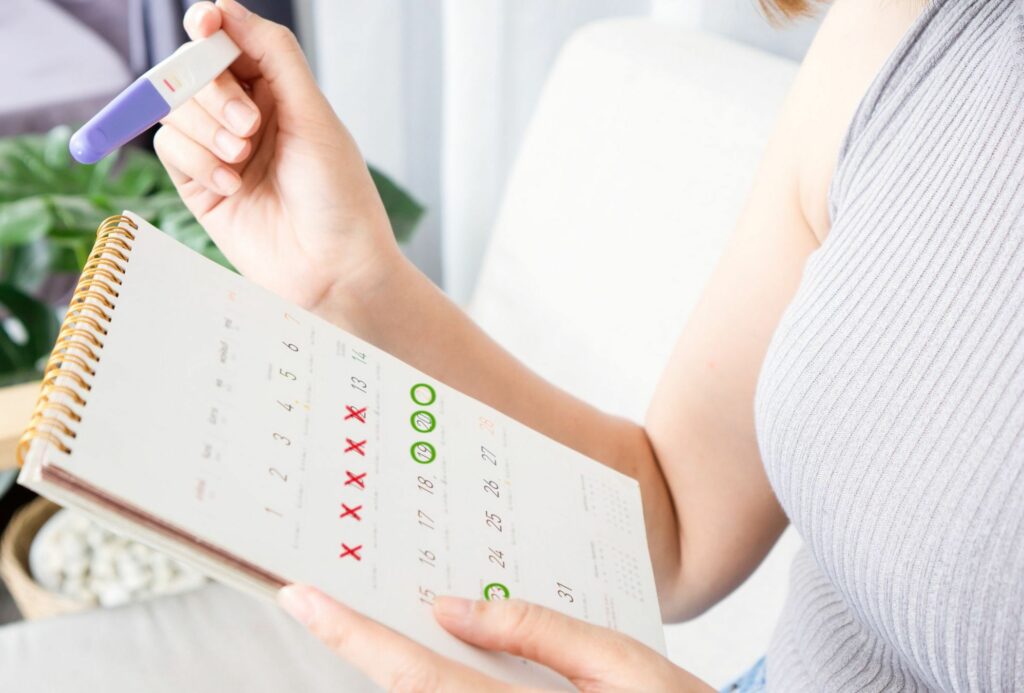
Timing is Everything: Effectively Tracking Your Ovulation Before Scheduling Your Vial Delivery
Understanding ovulation and fertility is crucial for maximizing the chances of conception through at-home insemination. You must plan your vial delivery just before your fertility window.
Several methods are available for tracking ovulation, including tracking basal body temperature, monitoring cervical mucus, using ovulation predictor kits, or tracking changes in the cervix. Each method has advantages and considerations, so trying different ways to find the one that works best for you may be helpful.
Timing insemination correctly is crucial for increasing the chances of conception. That's why we don't consider ovulation-tracking mobile apps to be a reliable method. These mobile applications can only provide a vague approximate fertility window. Use ovulation testing kits designed to track ovulation precisely and provide detailed instructions. Typically, these kits will include testing strips that monitor the presence and concentration of luteinizing hormone (LH) in your urine, which appears about 12 – 36 hours before ovulation. Insemination should occur within a day or two before ovulation or on the day of ovulation itself. Perfectly timing insemination ensures that the sperm is present in the reproductive tract when the egg is released, increasing the chances of fertilization.
I Ordered Donor Sperm, and My Vials Are Out for Delivery. What's Next?
Once you've purchased your vials from Cryobank America and our team has coordinated an excellent delivery time based on your schedule, you will receive a USPS tracking code. Your tracking code will tell you the exact date and approximate delivery time.
Once your delivery arrives, you'll receive your vials along with our at-home insemination kit. Our kit includes a pre-charged dry shipper containing your purchased vials, complete documentation, and a sterile syringe.
Our dry shippers are pre-charged in our laboratory to remain active during shipping. They transport biological specimens safely and hold cryogenic temperatures of -150°C or colder. Our dry shippers are manufactured with compounds that absorb liquid nitrogen, ensuring there won't be any spills during shipping. Each dry shipper ships inside a protective container to provide an additional layer of protection.
Your At-Home Insemination Kit
Your delivery will also include four valuable pieces of documentation consisting of the following:
- A package summary. Your summary will list what you ordered, including the vial type, quantity, and total cost for your purchase. It will also include an analysis of your vial's motility and sperm count.
- Infectious Disease Report. This information includes your selected donor's most recent lab testing and infectious/non-infectious disease reports.
- Complete instructions. This paperwork will guide you on handling your dry shipper, thawing your specimen, and performing insertion.
- Package return slip. We will also provide a return slip for your dry shipper.
Lastly, you will receive a ready-for-use sterile syringe. Remember, you have seven days from the shipment date to complete the insertion. If shipping your vials and accompanying equipment takes two days, you will have five days to perform at-home insemination.
Tips for Successful At-Home Insemination
Creating a comfortable and safe environment is very important during insemination. Make sure your space is clean and free from distractions. It may be helpful to create a relaxing atmosphere by playing soothing music or using aromatherapy.
Experts recommend lying flat or with your hips elevated for 25-30 minutes following gentle insertion. You can inseminate once if you're confident in your fertility window calculation. If unsure, consider inseminating twice.
Climaxing through clitoral stimulation can also increase your chances of conception. When a woman climaxes, her cervix becomes more receptive to sperm.
Refrain from strenuous exercise for a few days following insemination and continue to eat healthy. Eliminate processed foods with a high list of ingredients and stick to whole foods as long as possible. Avoid foods that are hard to digest, such as red meats, greasy foods, and refined sugar. Drinking alcohol or using tobacco products isn't recommended during your insemination, as they harm egg quality and fertility.
How We Can Help You Through Your Journey
Our assistance doesn't stop at shipping your vials! If you have any questions before, during, or after you've initiated your insemination, don't hesitate to pick up the phone. We've helped many individuals and couples who have embarked on this journey already, and we look forward to applying our expertise and genuine care to help make everything as easy and stress-free as possible.
- Protecting Your Health: Choosing A Sperm Bank Over Natural Insemination
- Hatching a Plan: Learning The Basics About Assisted Hatching in IVF
- Navigating GYN Surgery Before Artificial Insemination
- PGT Testing and Its Role in IVF Treatment
- The Ultimate Guide To Where You Can Donate Sperm In All 50 States
Understanding the Importance of Choosing the Right Sperm Donor
Choosing the right sperm donor is crucial for anyone considering donor insemination. The process of selecting a donor can seem overwhelming, but it is essential to take the time to make an informed decision. Like traditional conception, a sperm donor can significantly impact a child's health, development, and emotional well-being. In this article, we will explore the importance of choosing a suitable sperm donor and help guide you in making the best decision for you and your family.

Health and Genetic Factors to Consider When You Select Your Ideal Sperm Donor
A child's genetic makeup plays a significant role in their health and development. When choosing a sperm donor, one must consider their medical history and genetic health. Genetic conditions can be passed down from a parent to their child, and it is crucial to ensure that the donor does not carry any genetic mutations that could cause health problems for the child. That's why Cryobank America conducts rigorous screenings on all of our donors before their specimens are accepted into our program. These screenings include infectious and non-infectious diseases, a complete blood count, urinalysis, drug testing, and chromosome analysis. Once you've shown interest in a particular donor, we can provide you with their history of health, history of fertility, and family medical history.
In addition to physical health, the emotional and psychological impact of knowing one's biological origins is also essential to consider. Children conceived through donor insemination may have questions about their biological origins, so it is important to understand your donor's psychological traits. As part of joining our Sperm Donor Program, each donor must visit a psychiatrist and undergo a complete mental health evaluation. Cryobank America is one of the few clinics requiring this step to participate in a donor program.
Background and Educational Factors to Look For During Your Donor Search
Throughout your journey of finding a perfect sperm donor, there are factors to consider other than overall health and genetics. These include education, occupation, personal values, and interests.
Education and occupation can tell you a lot about a donor, such as their primary interests, level of intelligence, and how much drive and focus they acquire. Some parents may want a donor with a high education level or a particular occupation, while others may place less emphasis on these factors. Regardless of your preference, Cryobank America verifies this criterion with every donor who enters our program, requiring all potential donors to have a college degree. To ensure the safety of your selection, we also perform a complete criminal history background check on all of our donors.

Physical Characteristics and Traits are Good Things to Consider Before Making Your Sperm Donor Selection
Physical characteristics and traits are also important to consider. Some parents may want a donor with similar physical characteristics, while others may prioritize height, eye color, or hair color.
Personal values and interests can also be essential to consider. Some parents may want a donor who shares their religious or political beliefs, while others prioritize other values and interests.
Cryobank America has an eclectic roster of donors as we aim to provide various physical and personality attributes. Our donors fill out a characteristic questionnaire, write a handwritten letter, and create a donor essay, helping you feel like you've gotten to know them. When you sign up for our Premium Membership, you'll unlock this valuable information, additional childhood photos, and an audio interview!
The Role of Donor Profiles in Sperm Donor Selection
Donor profiles are an essential tool in the sperm donor selection process. Interpreting sperm donor profiles can be challenging, especially regarding medical terminology and genetic testing results. It's important to review each profile carefully and understand the information provided to identify any concerns. Look for donors who meet your criteria regarding medical history, physical characteristics and traits, education and occupation, and personal values and interests. Prioritize your preferences and decide based on what is most important to you and your family.
At Cryobank America, our basic donor profiles include one childhood photo, alias name, donor ID number, height, weight, blood type, hair color, eye color, skin tone, race, the highest level of education, and CMV status. These basic attributes will help guide you in selecting the perfect sperm donor.
Making the Decision to Choose Anonymous vs. Open Sperm Donors
There are legal and ethical considerations to consider when selecting a sperm donor. It is essential to understand the legal rights and responsibilities of sperm donors and recipients and to evaluate the ethical implications of donor anonymity and disclosure.
One of the most significant decisions parents must make when selecting a sperm donor is whether to choose an anonymous or open donor. Anonymous donors do not agree to be contacted by the child in the future, while open sperm donors accept the possibility of contact.
There are benefits and drawbacks to both anonymous and open sperm donors. Anonymous donors provide privacy and anonymity that some parents may prefer. In contrast, open donors allow for the opportunity for the child to learn more about their biological origins.
Select Your Ideal Sperm Donor: Tips and Resources for Success
Finding the ideal sperm donor may seem complicated; that's why we've gathered many resources to help keep you on the right track! Our reputable donor database provides a wealth of information about our donors, and there are many helpful articles and tips available for guidance and support right here on our website.
Choosing the most suitable sperm donor is crucial for anyone considering donor insemination. By taking the time to make an informed decision, you can ensure the best possible outcome for your child's health, development, and emotional well-being.
Click here to get started or click here to learn about our Conception Commitment™ Program!
- Protecting Your Health: Choosing A Sperm Bank Over Natural Insemination
- Hatching a Plan: Learning The Basics About Assisted Hatching in IVF
- Navigating GYN Surgery Before Artificial Insemination
- PGT Testing and Its Role in IVF Treatment
- The Ultimate Guide To Where You Can Donate Sperm In All 50 States
Consider Yoga Before Donating Sperm
Yoga is a practice that has been around for thousands of years and provides numerous benefits for the mind, body, and soul. In recent years, there has been a growing interest in using yoga to improve male fertility, particularly in the context of sperm donation for at-home insemination. This article will explore the concept of Namaste and Conceive, which is the idea of using yoga to improve sperm quality and quantity for successful insemination.
Understanding the Importance of Sperm Quality Before Donating
Sperm quality plays a crucial role in successful insemination. Poor sperm quality can lead to infertility and can also affect pregnancy outcomes. That's why we won't accept sperm samples that fail to meet our criteria. Sperm count, motility, and morphology determine sperm quality. Low sperm count means that there are fewer sperm available for fertilization, while poor motility means the sperm cannot swim effectively toward the egg. Abnormal morphology refers to the shape and size of the sperm, which can also affect their ability to fertilize the egg.

How Yoga Can Improve Sperm Quality and Quantity
Research has shown that yoga can improve male fertility by improving sperm count, motility, and morphology. Yoga helps reduce stress, a significant factor that can negatively impact male fertility. Stress can affect the production of testosterone, which is essential for sperm production. Yoga also helps to improve blood flow to the reproductive organs, which can increase the production of healthy sperm.
The Role of Stress in Fertility and How Yoga Can Help
Stress is a physiological response to a perceived threat or challenge. It triggers the release of hormones like cortisol and adrenaline, which prepare the body for fight or flight. While this response is helpful in short-term situations, chronic stress can negatively affect health.
Chronic stress can also lead to oxidative stress, which can damage sperm DNA and reduce fertility. By reducing stress through yoga, you're on your way to improving the vitality of your sperm and enhancing fertility.
Yoga Poses and Techniques for Improving Sperm Health Before You Donate
Several yoga poses and techniques can improve sperm health. Some of the most effective poses include the Cobra pose, the Bridge pose, and the Shoulder stand. These poses help to improve blood flow to the reproductive organs, which can increase the production of healthy sperm. Other techniques that can help to improve sperm health include deep breathing exercises, meditation, and visualization.
Tips for Incorporating Yoga into Your Routine Before Donating Sperm
Incorporating yoga into your routine before you donate sperm can greatly improve sperm health and increase the chances of successful insemination when a family or individual purchases your vial. Some practical tips for incorporating yoga into your routine include finding a routine that works for you! We all have busy schedules, but once you begin to take steps toward incorporating a yoga routine, it'll become second nature. To start, try practicing consistently and set aside time each day for yoga practice. Setting the alarm for the times you wish to practice each day will ensure you will remember. It is also essential to listen to your body and avoid overexertion. Drink plenty of water so you're staying hydrated.
Lastly, don't give up on trying to enhance your sperm quality with yoga and other meditation practices! At Cryobank America, we're looking for suitable candidates to donate sperm. When you join our program, you can help a family fulfill their dreams of conceiving while you receive extra income!
Click here for more helpful tips.
Click here to learn about our qualifications and incentives for becoming a donor.
Have you ever wondered how Cryobanks, Sperm/Egg/Embryo Storage Centers, and Fertility Clinics can store cells that can live for 30+ years? Cryopreservation is the answer, and we want to inform you how we do this.
We use Liquid Nitrogen (LN2) to preserve human cells and tissues in suspended animation at cryogenic temperatures. Liquid Nitrogen is very cold; it is -196 degrees Celsius, or for people in the US, it translates to -321 degrees Fahrenheit. Liquid Nitrogen boils at room temperature, so we must be careful to keep it cold so that it does not boil and get too warm, allowing the cells to thaw out. With the help of freezing media and a proper technique, it will protect the cells from ice crystals, exploding and shrinking.
Doing this results in a preserved cell with an indefinite shelf-life. Once correctly thawed, the cells can resume back to their initial state. Cryopreservation allows people to utilize sperm/eggs/oocytes for future use if they become infertile, which can help many people!
If you would like more information about preserving your ability to conceive in the future, please visit our Directed Donor or Personal Sperm Banking pages, or contact us by email at [email protected] or by phone at 817-945-8708
ARLINGTON, Texas., September 1, 2017
Cryobank America, the newest sperm bank in the U.S., is pleased to announce its opening in the Dallas-Fort Worth area of Texas.
Located at 3050 S Center St., Suite 100, Arlington, TX 76014, Cryobank America is headquartered in the Medical City District of Arlington between I-20 and I-30 near the University of Texas – Arlington.
With the global sperm shortage causing a previously unseen crisis, many couples and single women are turning to sperm donors to start or expand their families. Dr. Sunday Crider, Ph.D. HCLD/ELD, the Tissue Bank Director and Laboratory Director at Cryobank America, adds, “A simple search online about male infertility and donor sperm shortage yields thousands of results from countries around the world, all facing this same significant issue.”
With the Dallas-Fort Worth area comprising many ethnicities and backgrounds, Cryobank America carefully chose this location amongst many others. “The city of Arlington is in-between two major metropolitan areas in Texas,” Sanjay Kumar, CEO, and Co-founder, explained, “This allows us to choose the best Texans to be a part of our program”.
Rigorous eligibility requirements at Cryobank America ensure that the donors who enter the Sperm Donor Program are narrowed down to only the best candidates. Less than 1% of potential donor applicants become fully eligible donors. Once specimens are moved out of quarantine per FDA requirements, units are shipped worldwide to aid in combating the shortage.
Cryobank America also caters toward directed sperm donors. These donors are men who are either storing their specimen as an insurance policy, should they lose their ability to be fertile in the future, or donors who will be donating their specimen to an intended recipient. “Men in occupations that place them at risk are encouraged to bank their sperm to preserve their fertility, including policemen, firefighters, and military members,” says Dr. Crider. “Additionally, men facing serious illnesses such as cancer or men wanting to get a vasectomy can all benefit from cryogenic preservation of their specimens.”
The staff at Cryobank America comprises highly educated and trained professionals, all holding at least a master’s degree in the biological sciences field. The entire staff is very excited to begin working on helping countless couples and individuals worldwide make their dreams of starting a family a reality.
For more information, contact [email protected]


